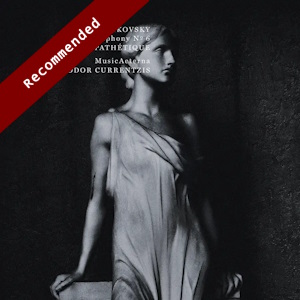
Piotr Ilyich Tchaikovsky (1840-1893)
Symphony No. 6 in B minor, Op. 74 ‘Pathétique’
MusicAeterna/Teodor Currentzis
rec. 2015, Funkhaus, Nalepastraße, Berlin.
Sony Classical 88985404352 [44]
While reviewing the new Brilliant re-issue of the Complete Tchaikovsky Symphonies by Pletnev, I was surprised to discover that this, one of my favourite recordings of the Pathétique, had never been reviewed here on MusicWeb. Both Currentzis and Pletnev are regarded as maverick conductors in the Stokowski mould, given to eccentric gestures which sometimes flop and sometimes pay off magnificently; for me, this recording is decidedly in the latter category but some will balk at his idiosyncrasies; better that than faceless conformity and its resultant boredom, say I – although I loathe Currentzis’ treatment of the Mozart operas he has recorded!
Whatever you ultimately think of this performance, it is played with an extraordinary intensity and commitment, especially with regard to the volatility of Currentzis’ application of dynamic – rather than temporal – extremes, and structurally it is all of a piece, conceived with great integrity. I have read critical objections to the sound engineering and yes, you are essentially sitting in the front row a few yards away from the double basses – and I love it. One critic complains of old Soviet-Melodiya-style shrillness in the violins; not to my ears. Nor is it true that the recording is devoid of concert hall ambience; there is definitely some space and reverberation around it.
The brooding intensity of the opening is enough to engage all but the most jaded of reviewers; people nowadays complain about a homogenised, generalised, “international” sound – well, not here. I also love the way Currentzis is unafraid of pauses, as per the first prolonged one at 4:33; you literally or figuratively lean forward waiting for that beautiful, plangent melody to start and the first orchestral outburst at 10:13, after a barely audible pianissimo, will shock the listener, especially if headphones are being employed. The subsequent tempest is as thrilling a piece of orchestral playing as I know, on the edge of feasibility, but the virtuosity of MusicAeterna is stunning. The maelstrom of sound beginning 13:30 graphically depicts psychological crisis like no other recording I have encountered, and the tenderness and resignation of the pizzicato-grounded coda is unparalleled.
The five-beat “waltz” is sumptuously played, the strumming of the double-basses underpinning its melodic sensuality, yet sentimentality is avoided by virtue of Currentzis’ adoption of a faster pace than is usual, lending a certain incipient hysteria to its superficially elegant insouciance; the result is vaguely uncomfortable – as perhaps it is meant to be; it is suggestive of putting on a show to conceal hidden anxieties and as such is psychologically convincing. The third movement Scherzo is similarly driven and again one marvels at the string players’ dexterity in executing those runs at breakneck speed. It is absolutely thrilling.
However, it is in the finale that Currentzis most challenges conventional practice. His audible intake of breath on the upbeat before the first note indicates the fervency of his involvement and every note thereafter is played with such ferocity; the snarling of the trombones and horns is chilling, the depth of despair heart-breaking, the final notes utterly, hopelessly nihilistic, without hope of comfort or redemption.
I suggest that you skip the conductor’s booklet notes; his forte is in music-making, not purple prose. Whatever you think of this recording – and obviously I adore it – you will not be bored.
Ralph Moore
Help us financially by purchasing from



















